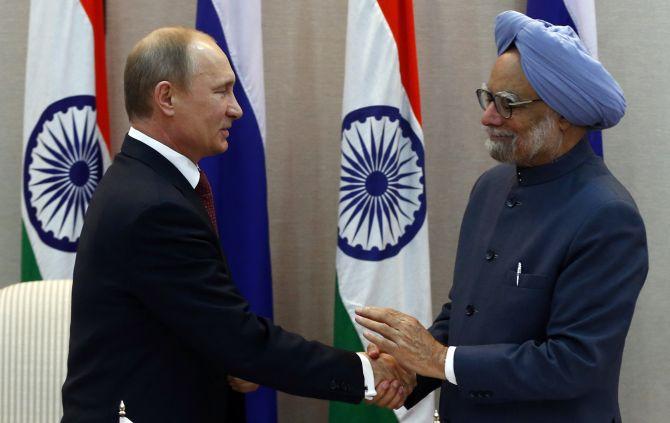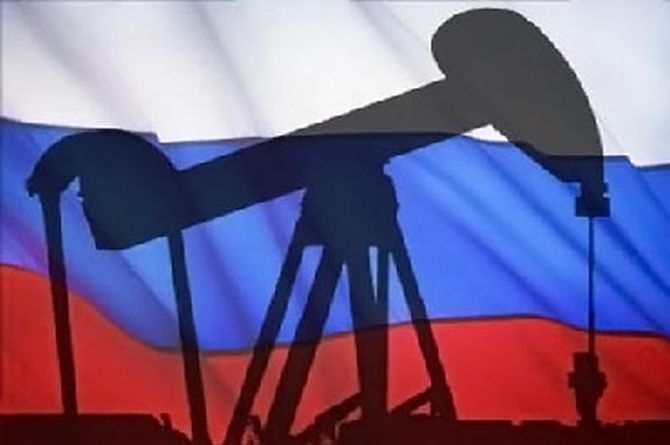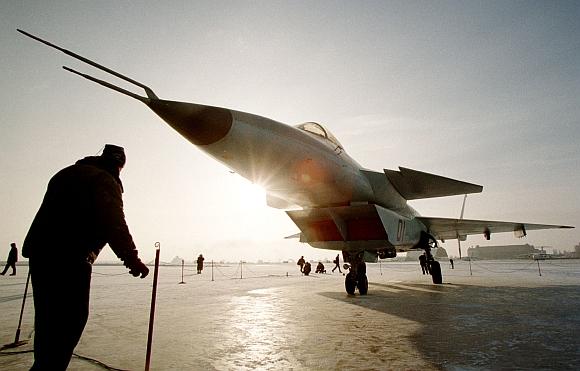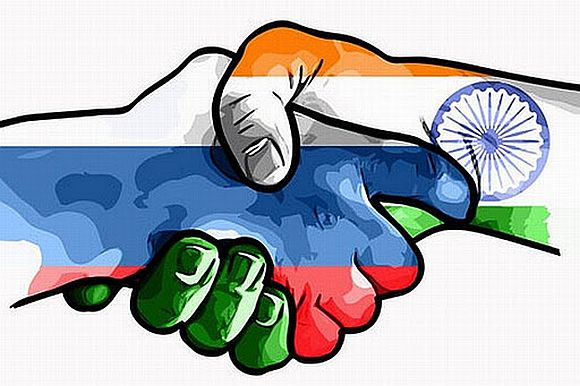Photographs: Grigory Dukor/Reuters Sheela Bhatt in New Delhi
The challenge for India and Russia is to make the relationship more broad-based and give it greater economic content, says former ambassador to Russia, Ronen Sen, who spoke exclusively to Sheela Bhatt
Prime Minister Manmohan Singh’s visit to Moscow from October 20 to 22 is not just a ritual, says Ronen Sen, former ambassador to Russia.
Sen was in Moscow between 1992 and 1998, when he witnessed the post-Soviet Union turbulence in the divided country.
“Despite occasional hiccups and problems this relationship is the closest and most resilient relationship between any two countries in the last 60 years of world history,” he said.
He dismissed the description that it will be Dr Singh’s “farewell visit” to Moscow on Monday since elections are due next year.
“India is among those countries of consequence where individuals don’t block important matters. There is definite continuity in the institution of prime minister of India. The legacy carries on and survives,” Sen said.
“In such relationships personalities do matter. That’s why there are annual summits. Such diplomacy is never on autopilot,” he added.
Sen is a distinguished and unique diplomat who has served as ambassador to Russia, Germany and America. He is well-known for having the distinction of handling 180 bilateral visits in his enviable career.
...
'India-Russia ties must be freed from over-reliance on inter-governmental mechanism'
While talking about the main challenges in the India-Russia partnership, he said, “The challenge is how to make this relationship more broad-based and give it greater economic content. Without extensive economic balance no relationship can acquire strategic dimension and can become self-sustaining. In other words we have to free India-Russia relationship from unhealthy over-reliance on inter-governmental mechanism and we should broaden the base of its stakeholders by greater engagement.”
“Trade, high-tech collaboration of private players, private investment in diversified sectors, greater people to people contact, education and tourism are such areas where engagement should increase,” adds Sen.
Some progress has been made but it’s not enough. “Trade has increased by 25 per cent and tourism has grown much more, but total number of people's movement is still low,” he said.
India should not take incremental steps in its relationship with Russia. Sen insists India should take a bold political view and make it easier for people to take the relationship further.
When asked for his take on Dr Singh’s Russia policy compared to what the prime minister did so explicitly to boost Indo-US relationship, Sen said what Dr Singh did for the US is an entirely different game. What the PM wants to do with Russia is on a completely different level, he said. With Russia he was trying to maintain continuity while in the US the prime minister was set to transform the relationship.
“With the US we were fundamentally transforming the relationship. We were going much beyond the nuclear trade. We completely overturned the Carter legacy. Also, as the recent book The Blood Telegram narrates, that Nixon-Kissinger legacy we have tried to change dramatically. Not only has the US attitude to look at India through the Pakistani prism changed, but its regional perspective has also dramatically changed. That was transformational. Russian relationship can’t be seen in a similar context,” Sen explained.
“As I mentioned earlier this is the most closest and resilient relationship in the world. There is continuity. Even after the break-up we could establish a relationship in the Yeltsin years. Look at the agreements on nuclear trade, nuclear submarine projects etc. They carry the stamp of continuity. The idea of strategic partnership was put on paper in Primakov’s time and was implemented by Putin,” he said.
...
'Russia will remain India's major defence partner but relationship won't be exclusive'
Image: The new multi-functional front-line fifth-generation fighter, code-named Project 1-42, at Zhukovsky flight and reseach institute outside MoscowPhotographs: Viktor Korotayev/Reuters
“I would say again, you should not look at an individual’s contribution because there is continuity, attention and focus in India-Russia relation. Let me give you the example of atomic energy. Russia has honoured its commitment to India even to an extent of not applying its law passed by the Duma, that too with retrospective effect in the Kudankulam nuclear reactors in India,” Sen said.
When asked about the alleged Russian pressure on India to have a liberal nuclear liability clause favouring Russian suppliers, Ronen Sen spoke in favour of more trade and liberal clauses of the liability laws.
He said, “It is a bit unfair to talk about Russian pressure. Even after the collapse of the Soviet Union, during the difficult transition period, they honoured their commitments and didn’t apply with retrospective effect their law passed by their own law-making body the Duma. Let’s face it; India has not reciprocated in full measure to Russia’s resolve to honour their Indian commitment.”
Sen said India had prior commitments with France, the US and other countries as well.
“What was the central point of India’s case in Tarapur? How can the US Congress adopt a law that goes against their own prior commitment? That is applying the law retrospectively in Tarapur. We expect the world to keep on honouring their commitments but let us not pretend that we are unique. Why did Russia allow us to get away retrospectively? Why did the US make specific exemption to its law only with respect to India? Not only in the NSG but the US law was changed for one country,” said Sen.
Sen said diversification of India’s defence trade, away from Russia, started much earlier and is not entirely a recent phenomenon. It started during (former prime minister) Indira Gandhi’s time and continued in Rajiv Gandhi’s, when the light combat aircraft came from GE in the US.
“Russia will remain one of India’s major defence partners. It has a track record of reliability and continuity. But this relationship will not be an exclusive one anymore. There is another difference as well. Russia is now the largest defence collaborator with China. But, in today’s context, Russian firms will have to be more competitive and cost-effective,” he said.
...
'Russia and China now have a growing, dynamic relationship'
Sen said Russia earlier had almost a kind of containment policy against China but now they have changed the relationship.
"In an international relationship you can’t talk in absolutes. In international diplomacy, like in life, it’s not the strongest who survives but the most adaptable. Russia and China now have a growing, dynamic relationship,” says Sen.
When asked how the Putin-Singh meeting will work on Monday, Sen, who has been part of hundreds of high-level meetings, said, “No summit-level meeting has a predetermined agenda. Only the broad subjects are decided which are taken up. I have never attended a summit that followed a predetermined agenda.”
Sen said Putin’s stand on India is very positive. He knew India enough even when he was first deputy mayor of St Petersburg, and has knowledge of India’s complex issues.
Putin didn’t see India as the ideological baggage of its past. Putin has realised that this relationship is based on convergence of national interests of both countries and convergence of shared concerns.
In fact, it was reflected much earlier in the 1994 India-Russia declaration. That was the first international document at the summit level, signed during P V Narasimha Rao's visit to Moscow, which recognised the threat from religious extremism and terrorism. That is exactly what happened a few years later, Sen said.





article